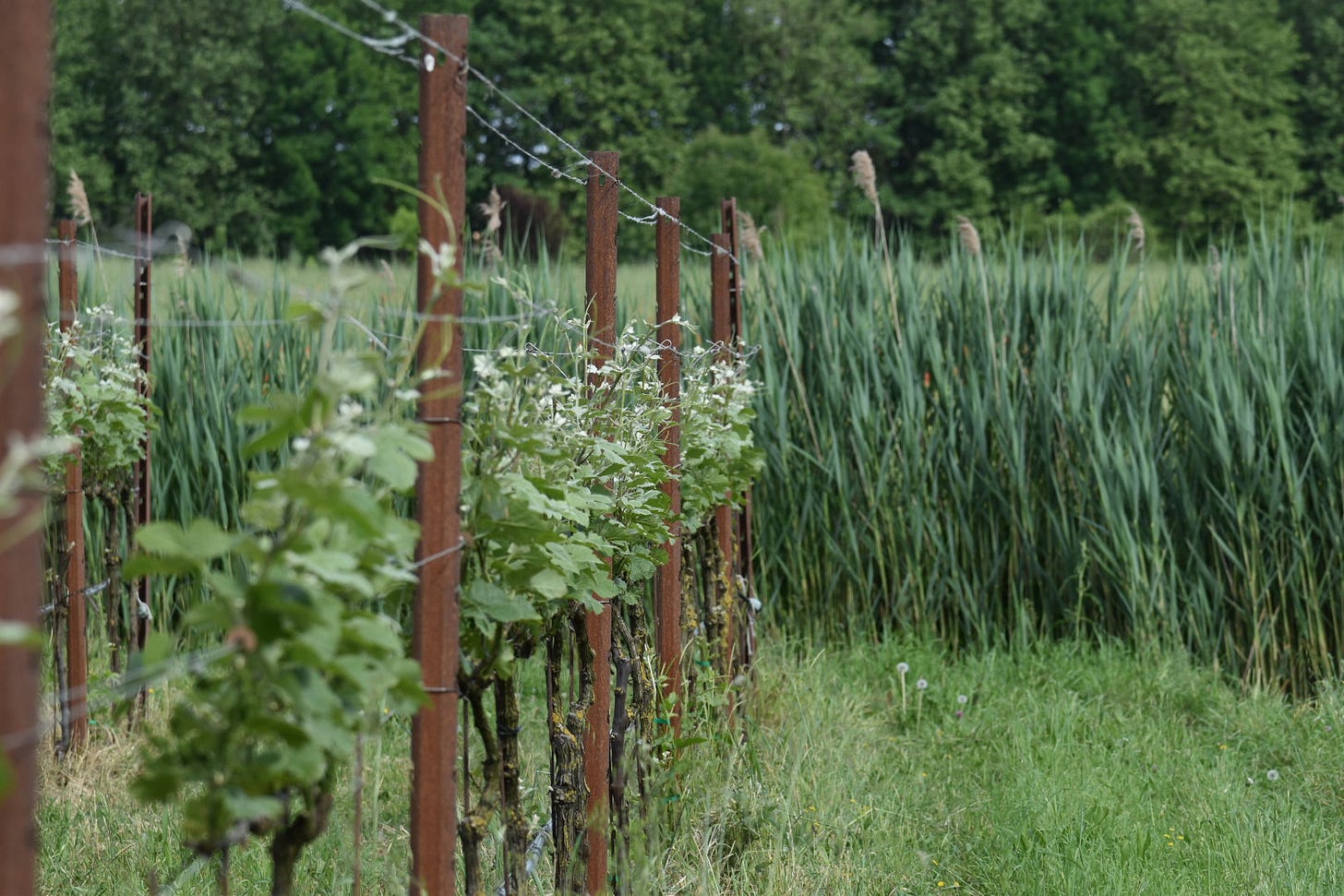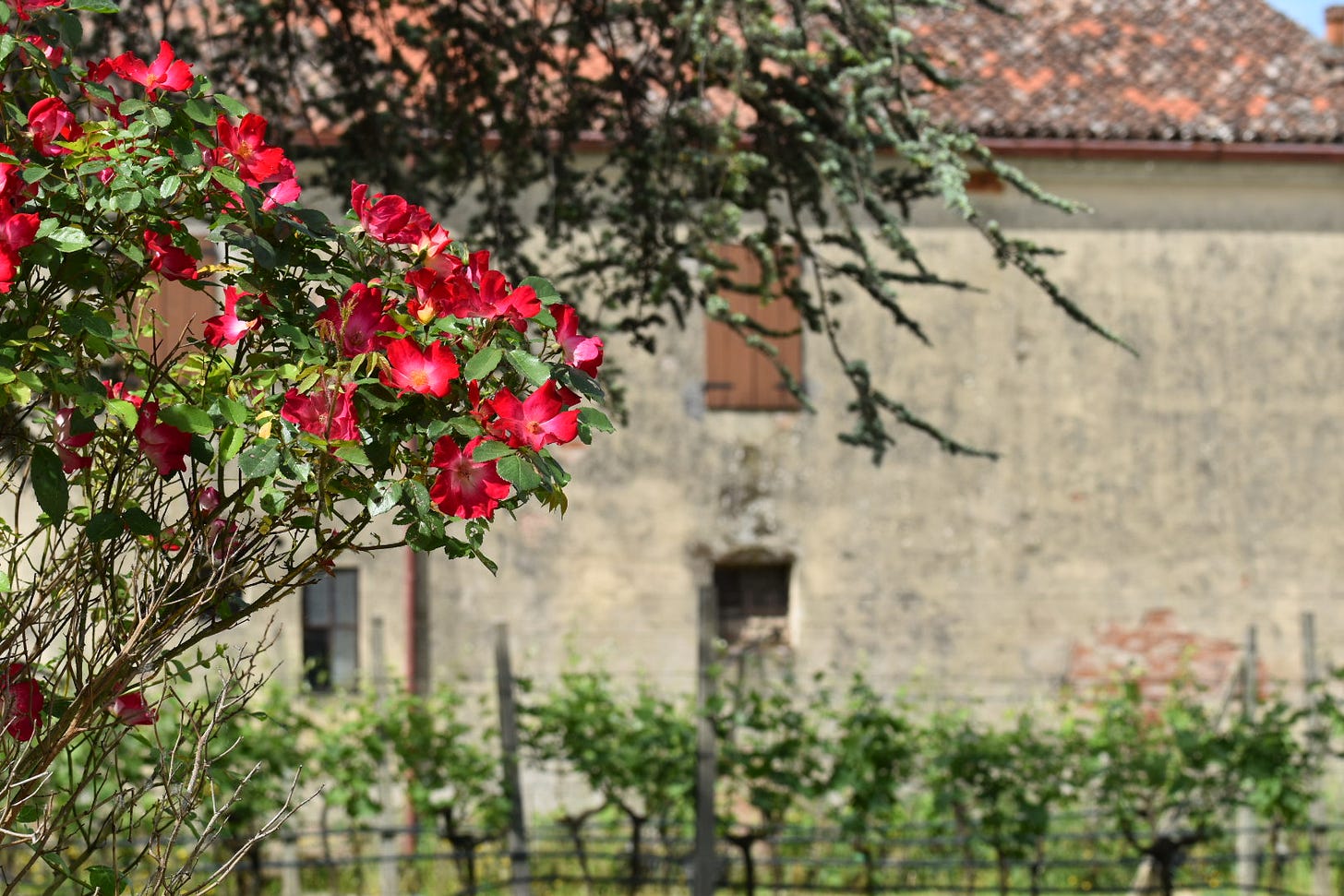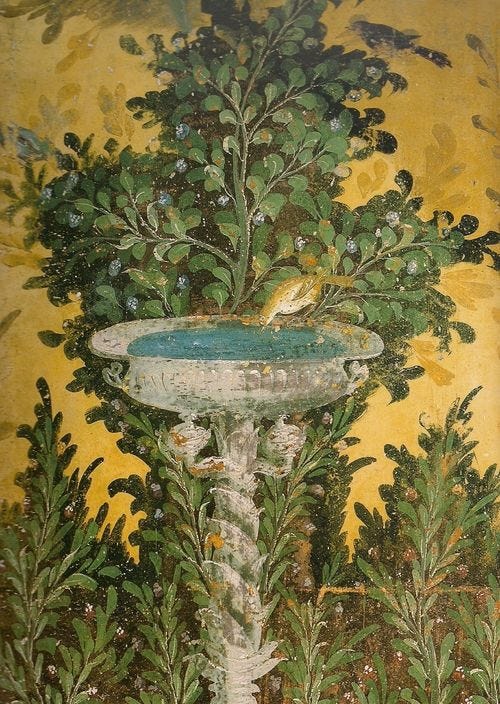I was outside, in intense sun, the day they put my grandma in the ground. It is spring pruning season here, a labor which goes by many other names—despunte de brotes in Spanish; éclaircissage in French; here in Italy, scacchiatura or just potatura verde, green pruning. It’s the moment in the growth cycle of the vine after buds have broken and before flowering, when baby green and pink buds and shoots erupt all over the plant, both the head of the vine and along all its canes or cordons. It’s your job at this moment—if you in fact are a quality-oriented, borderline obsessive, hand-work type in the vineyards—to go through plant by plant and remove all the little buds, suckers, and shoots which are not in the right places, not from the buds you selected during winter pruning.
This work has many purposes: to manage the vegetative push of the vines as lymph is being drawn up, up from the roots and the ground, ever skyward. To keep leaves from becoming too hectic, blocking nascent grape clusters from air flow and trapping moisture. To make sure your vines aren’t giving you less than optimal canes with no fruit. And so on.
In Spanish, the buds or little shoots that aren’t the correct ones have a name -- los nietos, or the grandchildren. My grandmother went to the grave with 15 grandchildren, growing laterally, stretching out every which way. I am one of them, left as a point for growth. As of my last counting, there were something like eight great-grandchildren and coming up on three or four great-greats. Even Grandma had trouble remembering them all at the end; she kept everyone’s names and birthdays on a yellow legal pad, with help from one of her daughters. To be alive nearly a century and to see generations unfolding out in front of you in waves, such that you can hardly keep track—it must make you feel sort of funny. Grandma seemed proud of it on one hand, but lonely for her own origins, on the other. More than once and a bit crossly and wistfully, she told us she was the last of her family.
In the latter half of April there was an anti-cyclone weather pattern, whirling its way up from Africa, northward across the Mediterranean. It was early summer temperatures for nearly two weeks, providing an odd but useful window in which to do this green pruning. The first full day out on the little work wagons we use, I got an uproarious sunburn on my upper back and the tops of my thighs. The day they put my grandma in the ground, it was also so sunny and hot; we completed green pruning in the parcel that gives its fruit ultimately to a rosé rifermentato sparkling. When we finished, I sat in the shadow of a little copse of trees next to a stream, right in the corner of the vineyard. A lady duck and her mallard like to hide there this spring, and wild blackberry bushes are blooming on the rivulet’s edge. I felt crispy and so sad.
Here on the property, around the house and the park of trees, right next to the first vineyard plantation, my guy’s grandparents kept dozens of roses. I doubt they ever envisioned a proper working farm here, beyond the tiny pocket of a plot in front of grandpa’s garage, the little wine made for personal consumption. Those dozens of roses tore up my beloved’s legs while he turned his little tractor around tightly-planted rows of vines. He vividly remembers being scratched to bits, then the eventual I can’t farm like this—and so you have it, los nietos pulled out of the yard, those heirs he didn’t keep. What he kept, instead: the cantina and the tiny wood-and-iron basket press, the almond tree, two figs, three cherries, one pomegranate and one persimmon, several lovely pines and one silly, top-heavy palm.
My grandma fussed at me all the years after I left home, twenty of them at this point: what are you doing over there? (Over there being New York, only 150 miles away; three hours by train). I explained: working, studying, living. It was hard for her to process; only one of her six children left the ancestral homeland in the Great Valley. But now probably 10 of the 15 grandchildren had gone off: Florida, Texas, California, Italy. That last one particularly hard to understand. Well, at least you’re not alone there, that’s good. As if the worst thing that could happen is that you could be far away, in particular far away and alone. My grandfather died 18 years before ; she lived alone in their apartment after, and never ceased to mention, grumpily, how long he didn’t stick around. Though I suspect she must have been glad for the break from never-ending baseball on the TV, volume turned way up.
We have no heritage plants in my family; there was never any property. So I remember the cherry tree from Grandma’s yard growing up; sad to lose it because it never “belonged” to them, as for many years they rented one half of a duplex. In my memory, however, it is in fact Grandma’s cherry tree, and I wonder what has become of it 30 years later. I also remember well her bird bath, a concept I now must explain to the Italian: you know, a plastic or stone basin sitting on top of a pedestal (so I learn the words bacino and piedistallo)—that you fill with water so the birds will come and then you get to watch them splash around and clean their wings? I am met with mild stupefaction. It seems the bird bath is an Anglo thing, purpose-built, 1830s popularization. God, how strange we Americans are with our garden gnomes and front porch flags and obsessively mown, monocultural grass. And birdbaths.
But it turns out to be not entirely true—I go digging: at the ruins of Pompeii and Herculaneum in Campania, there are marble remnants of birdbaths that have been excavated by archaeologists, as well as preserved frescoes featuring birds gathered around garden basins. I’m delighted to learn this, since I am headed there for my birthday this year, and so now I’ll be making a birdbath pilgrimage to the ancient world. He gets to keep his grandfather’s personal basket press and trees; I am busy cleaning up the birdbath in my mind.
Spring pruning continues for the next several weeks. The first passage through all the parcels is completed. It took nearly three weeks, so it is essentially time to close the wires on the trellises to help guide the now very tall shoots vertically; it’s also time to begin the second passage of green pruning for further buds that are ceaselessly breaking out. Everything in nature wants to push, this time of year, the force that through the green fuse drives the flower. (Doing this work I think of Dylan Thomas often.)
There is also the force that dries the mouthing streams, turns blood to wax. I am a bit heartbroken or offended that my grandma is now in the ground, that they covered her body with dirt. It seems undignified, not right for her irreverence or her ceaseless cooking or her wry sadness. Cover my body with dirt, sure, but leave her body be.
Summer will come soon, and with it a new work phase. We’re hoping the spring dries out some the next month or two, preventing certain onerous mildews that gnaw at fruit. The force that blasts the roots of trees is also our destroyer. Meanwhile I will mark down the sites at Herculaneum and Pompeii that feature avian life, fruit trees, wine presses.
What are you doing over there? Getting sunburned, learning viticulture. Looking for birdbaths in the ancient world.







